Cross-Cultural Communication in Japanese Business Etiquette
VerifiedAdded on 2023/04/21
|9
|2295
|487
AI Summary
This report discusses the concept of cross-cultural communication in Japanese business etiquette and its importance in establishing business collaboration. It covers Japanese business etiquette, potential areas for miscommunication, and the implications of the Hofstede model. Recommendations are provided for successful business communication.
Contribute Materials
Your contribution can guide someone’s learning journey. Share your
documents today.

Assignment Name Student ID
Assignment Name
Student ID
31 Mar 2019
1 | P a g e
Assignment Name
Student ID
31 Mar 2019
1 | P a g e
Secure Best Marks with AI Grader
Need help grading? Try our AI Grader for instant feedback on your assignments.
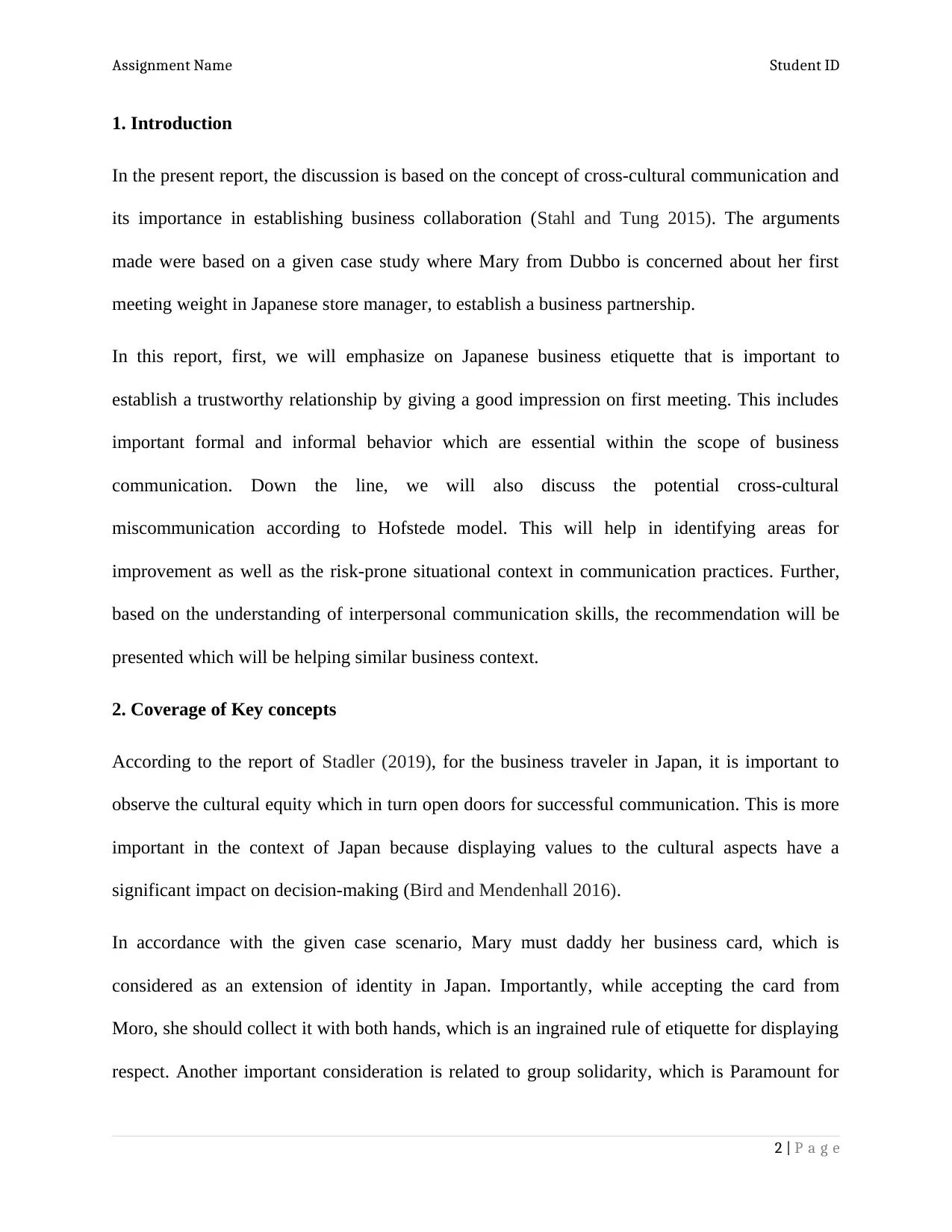
Assignment Name Student ID
1. Introduction
In the present report, the discussion is based on the concept of cross-cultural communication and
its importance in establishing business collaboration (Stahl and Tung 2015). The arguments
made were based on a given case study where Mary from Dubbo is concerned about her first
meeting weight in Japanese store manager, to establish a business partnership.
In this report, first, we will emphasize on Japanese business etiquette that is important to
establish a trustworthy relationship by giving a good impression on first meeting. This includes
important formal and informal behavior which are essential within the scope of business
communication. Down the line, we will also discuss the potential cross-cultural
miscommunication according to Hofstede model. This will help in identifying areas for
improvement as well as the risk-prone situational context in communication practices. Further,
based on the understanding of interpersonal communication skills, the recommendation will be
presented which will be helping similar business context.
2. Coverage of Key concepts
According to the report of Stadler (2019), for the business traveler in Japan, it is important to
observe the cultural equity which in turn open doors for successful communication. This is more
important in the context of Japan because displaying values to the cultural aspects have a
significant impact on decision-making (Bird and Mendenhall 2016).
In accordance with the given case scenario, Mary must daddy her business card, which is
considered as an extension of identity in Japan. Importantly, while accepting the card from
Moro, she should collect it with both hands, which is an ingrained rule of etiquette for displaying
respect. Another important consideration is related to group solidarity, which is Paramount for
2 | P a g e
1. Introduction
In the present report, the discussion is based on the concept of cross-cultural communication and
its importance in establishing business collaboration (Stahl and Tung 2015). The arguments
made were based on a given case study where Mary from Dubbo is concerned about her first
meeting weight in Japanese store manager, to establish a business partnership.
In this report, first, we will emphasize on Japanese business etiquette that is important to
establish a trustworthy relationship by giving a good impression on first meeting. This includes
important formal and informal behavior which are essential within the scope of business
communication. Down the line, we will also discuss the potential cross-cultural
miscommunication according to Hofstede model. This will help in identifying areas for
improvement as well as the risk-prone situational context in communication practices. Further,
based on the understanding of interpersonal communication skills, the recommendation will be
presented which will be helping similar business context.
2. Coverage of Key concepts
According to the report of Stadler (2019), for the business traveler in Japan, it is important to
observe the cultural equity which in turn open doors for successful communication. This is more
important in the context of Japan because displaying values to the cultural aspects have a
significant impact on decision-making (Bird and Mendenhall 2016).
In accordance with the given case scenario, Mary must daddy her business card, which is
considered as an extension of identity in Japan. Importantly, while accepting the card from
Moro, she should collect it with both hands, which is an ingrained rule of etiquette for displaying
respect. Another important consideration is related to group solidarity, which is Paramount for
2 | P a g e
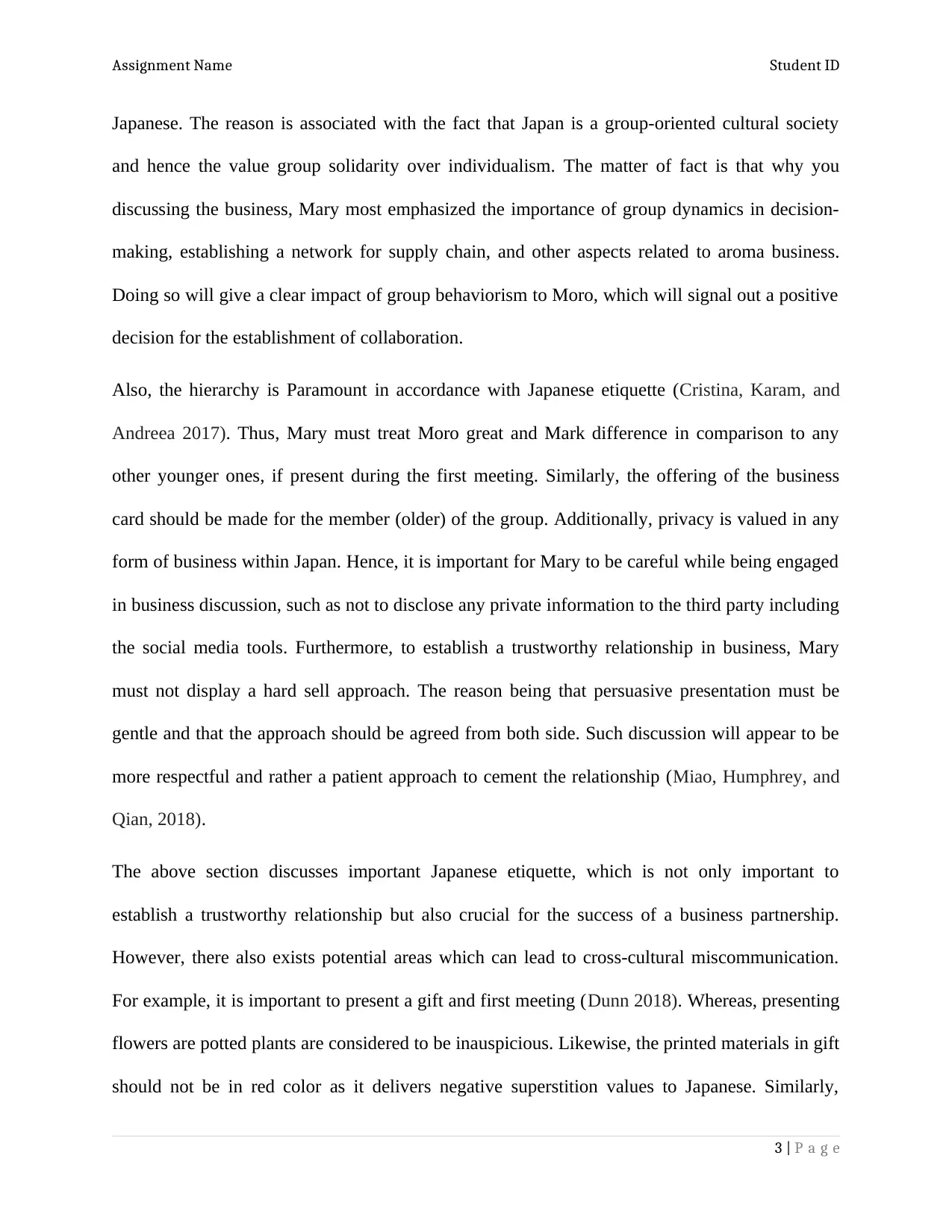
Assignment Name Student ID
Japanese. The reason is associated with the fact that Japan is a group-oriented cultural society
and hence the value group solidarity over individualism. The matter of fact is that why you
discussing the business, Mary most emphasized the importance of group dynamics in decision-
making, establishing a network for supply chain, and other aspects related to aroma business.
Doing so will give a clear impact of group behaviorism to Moro, which will signal out a positive
decision for the establishment of collaboration.
Also, the hierarchy is Paramount in accordance with Japanese etiquette (Cristina, Karam, and
Andreea 2017). Thus, Mary must treat Moro great and Mark difference in comparison to any
other younger ones, if present during the first meeting. Similarly, the offering of the business
card should be made for the member (older) of the group. Additionally, privacy is valued in any
form of business within Japan. Hence, it is important for Mary to be careful while being engaged
in business discussion, such as not to disclose any private information to the third party including
the social media tools. Furthermore, to establish a trustworthy relationship in business, Mary
must not display a hard sell approach. The reason being that persuasive presentation must be
gentle and that the approach should be agreed from both side. Such discussion will appear to be
more respectful and rather a patient approach to cement the relationship (Miao, Humphrey, and
Qian, 2018).
The above section discusses important Japanese etiquette, which is not only important to
establish a trustworthy relationship but also crucial for the success of a business partnership.
However, there also exists potential areas which can lead to cross-cultural miscommunication.
For example, it is important to present a gift and first meeting (Dunn 2018). Whereas, presenting
flowers are potted plants are considered to be inauspicious. Likewise, the printed materials in gift
should not be in red color as it delivers negative superstition values to Japanese. Similarly,
3 | P a g e
Japanese. The reason is associated with the fact that Japan is a group-oriented cultural society
and hence the value group solidarity over individualism. The matter of fact is that why you
discussing the business, Mary most emphasized the importance of group dynamics in decision-
making, establishing a network for supply chain, and other aspects related to aroma business.
Doing so will give a clear impact of group behaviorism to Moro, which will signal out a positive
decision for the establishment of collaboration.
Also, the hierarchy is Paramount in accordance with Japanese etiquette (Cristina, Karam, and
Andreea 2017). Thus, Mary must treat Moro great and Mark difference in comparison to any
other younger ones, if present during the first meeting. Similarly, the offering of the business
card should be made for the member (older) of the group. Additionally, privacy is valued in any
form of business within Japan. Hence, it is important for Mary to be careful while being engaged
in business discussion, such as not to disclose any private information to the third party including
the social media tools. Furthermore, to establish a trustworthy relationship in business, Mary
must not display a hard sell approach. The reason being that persuasive presentation must be
gentle and that the approach should be agreed from both side. Such discussion will appear to be
more respectful and rather a patient approach to cement the relationship (Miao, Humphrey, and
Qian, 2018).
The above section discusses important Japanese etiquette, which is not only important to
establish a trustworthy relationship but also crucial for the success of a business partnership.
However, there also exists potential areas which can lead to cross-cultural miscommunication.
For example, it is important to present a gift and first meeting (Dunn 2018). Whereas, presenting
flowers are potted plants are considered to be inauspicious. Likewise, the printed materials in gift
should not be in red color as it delivers negative superstition values to Japanese. Similarly,
3 | P a g e
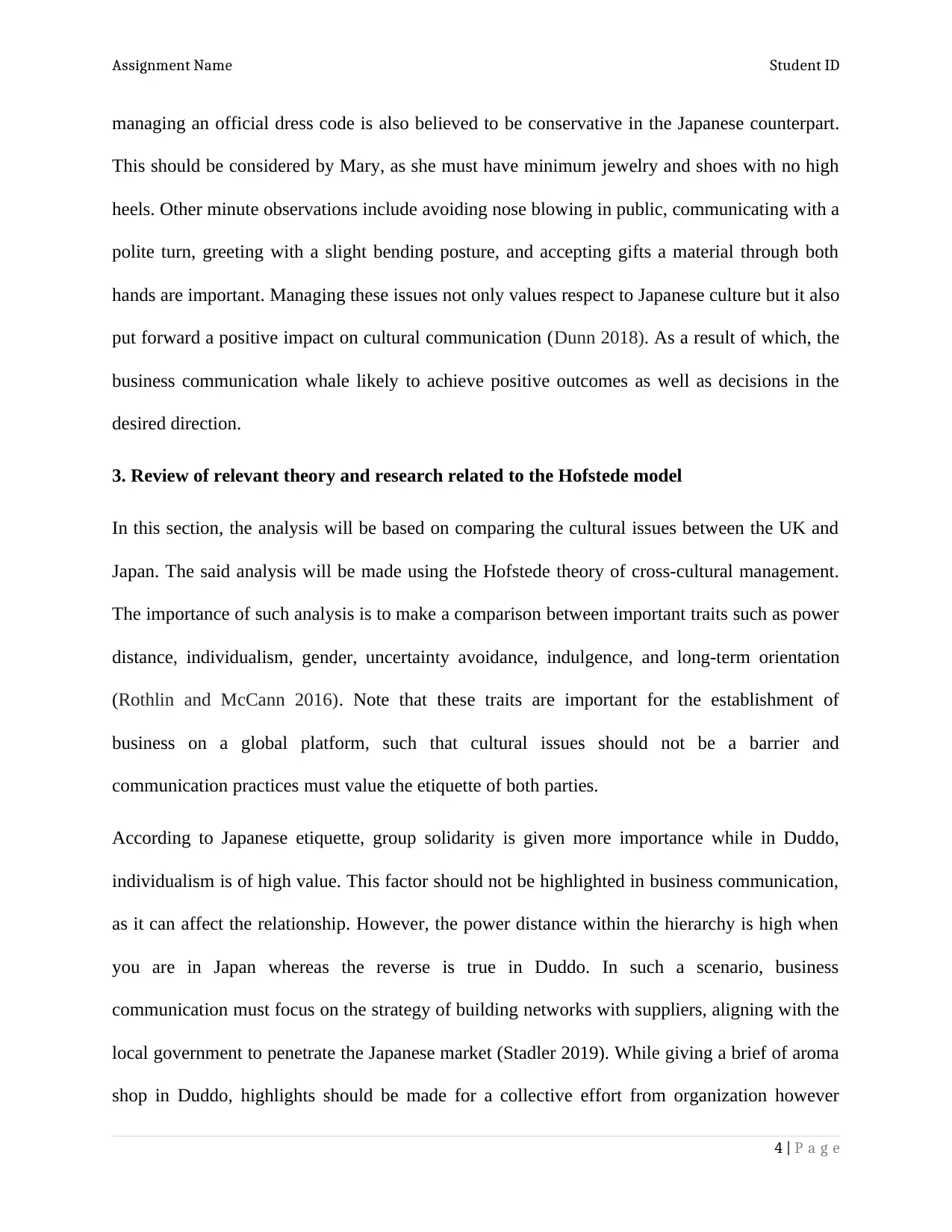
Assignment Name Student ID
managing an official dress code is also believed to be conservative in the Japanese counterpart.
This should be considered by Mary, as she must have minimum jewelry and shoes with no high
heels. Other minute observations include avoiding nose blowing in public, communicating with a
polite turn, greeting with a slight bending posture, and accepting gifts a material through both
hands are important. Managing these issues not only values respect to Japanese culture but it also
put forward a positive impact on cultural communication (Dunn 2018). As a result of which, the
business communication whale likely to achieve positive outcomes as well as decisions in the
desired direction.
3. Review of relevant theory and research related to the Hofstede model
In this section, the analysis will be based on comparing the cultural issues between the UK and
Japan. The said analysis will be made using the Hofstede theory of cross-cultural management.
The importance of such analysis is to make a comparison between important traits such as power
distance, individualism, gender, uncertainty avoidance, indulgence, and long-term orientation
(Rothlin and McCann 2016). Note that these traits are important for the establishment of
business on a global platform, such that cultural issues should not be a barrier and
communication practices must value the etiquette of both parties.
According to Japanese etiquette, group solidarity is given more importance while in Duddo,
individualism is of high value. This factor should not be highlighted in business communication,
as it can affect the relationship. However, the power distance within the hierarchy is high when
you are in Japan whereas the reverse is true in Duddo. In such a scenario, business
communication must focus on the strategy of building networks with suppliers, aligning with the
local government to penetrate the Japanese market (Stadler 2019). While giving a brief of aroma
shop in Duddo, highlights should be made for a collective effort from organization however
4 | P a g e
managing an official dress code is also believed to be conservative in the Japanese counterpart.
This should be considered by Mary, as she must have minimum jewelry and shoes with no high
heels. Other minute observations include avoiding nose blowing in public, communicating with a
polite turn, greeting with a slight bending posture, and accepting gifts a material through both
hands are important. Managing these issues not only values respect to Japanese culture but it also
put forward a positive impact on cultural communication (Dunn 2018). As a result of which, the
business communication whale likely to achieve positive outcomes as well as decisions in the
desired direction.
3. Review of relevant theory and research related to the Hofstede model
In this section, the analysis will be based on comparing the cultural issues between the UK and
Japan. The said analysis will be made using the Hofstede theory of cross-cultural management.
The importance of such analysis is to make a comparison between important traits such as power
distance, individualism, gender, uncertainty avoidance, indulgence, and long-term orientation
(Rothlin and McCann 2016). Note that these traits are important for the establishment of
business on a global platform, such that cultural issues should not be a barrier and
communication practices must value the etiquette of both parties.
According to Japanese etiquette, group solidarity is given more importance while in Duddo,
individualism is of high value. This factor should not be highlighted in business communication,
as it can affect the relationship. However, the power distance within the hierarchy is high when
you are in Japan whereas the reverse is true in Duddo. In such a scenario, business
communication must focus on the strategy of building networks with suppliers, aligning with the
local government to penetrate the Japanese market (Stadler 2019). While giving a brief of aroma
shop in Duddo, highlights should be made for a collective effort from organization however
4 | P a g e
Secure Best Marks with AI Grader
Need help grading? Try our AI Grader for instant feedback on your assignments.
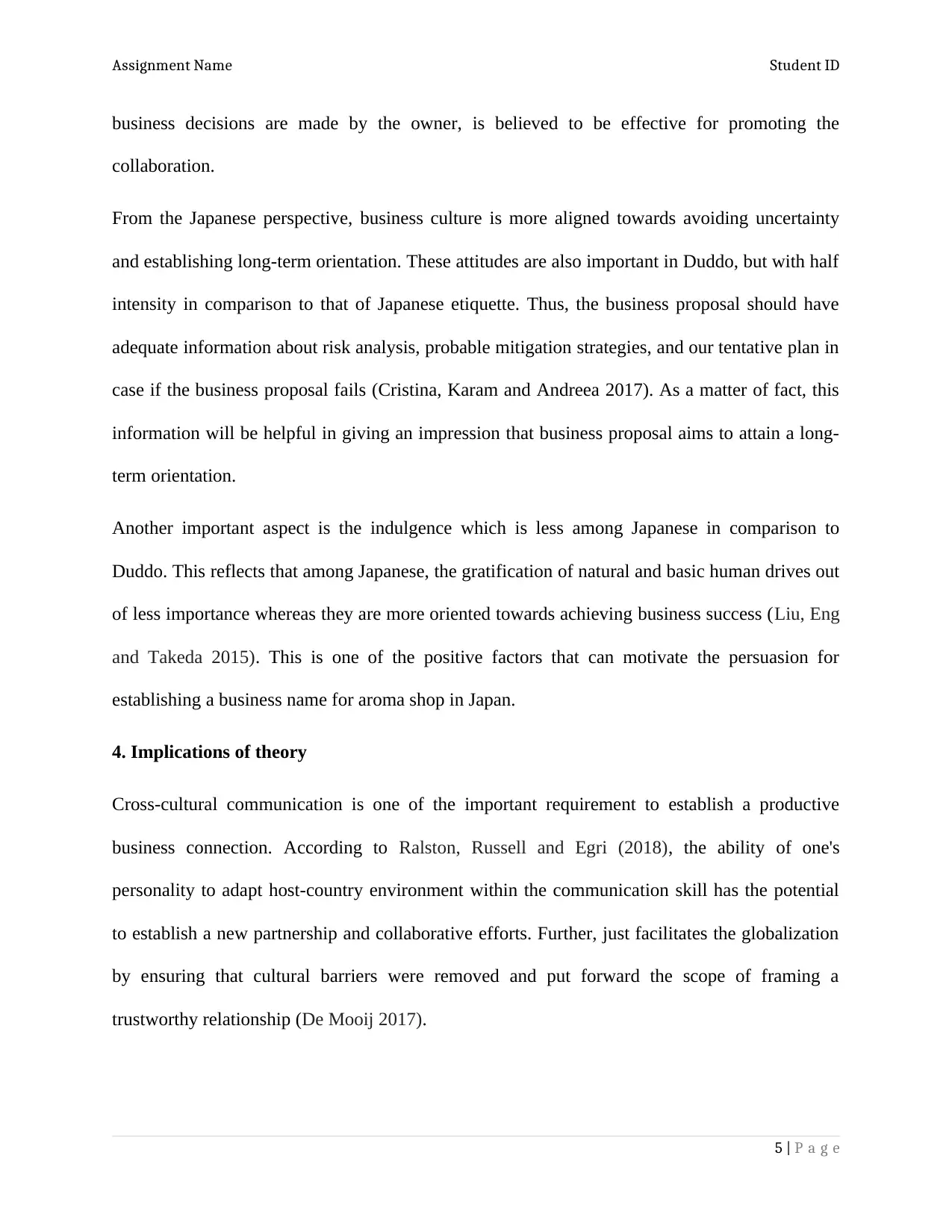
Assignment Name Student ID
business decisions are made by the owner, is believed to be effective for promoting the
collaboration.
From the Japanese perspective, business culture is more aligned towards avoiding uncertainty
and establishing long-term orientation. These attitudes are also important in Duddo, but with half
intensity in comparison to that of Japanese etiquette. Thus, the business proposal should have
adequate information about risk analysis, probable mitigation strategies, and our tentative plan in
case if the business proposal fails (Cristina, Karam and Andreea 2017). As a matter of fact, this
information will be helpful in giving an impression that business proposal aims to attain a long-
term orientation.
Another important aspect is the indulgence which is less among Japanese in comparison to
Duddo. This reflects that among Japanese, the gratification of natural and basic human drives out
of less importance whereas they are more oriented towards achieving business success (Liu, Eng
and Takeda 2015). This is one of the positive factors that can motivate the persuasion for
establishing a business name for aroma shop in Japan.
4. Implications of theory
Cross-cultural communication is one of the important requirement to establish a productive
business connection. According to Ralston, Russell and Egri (2018), the ability of one's
personality to adapt host-country environment within the communication skill has the potential
to establish a new partnership and collaborative efforts. Further, just facilitates the globalization
by ensuring that cultural barriers were removed and put forward the scope of framing a
trustworthy relationship (De Mooij 2017).
5 | P a g e
business decisions are made by the owner, is believed to be effective for promoting the
collaboration.
From the Japanese perspective, business culture is more aligned towards avoiding uncertainty
and establishing long-term orientation. These attitudes are also important in Duddo, but with half
intensity in comparison to that of Japanese etiquette. Thus, the business proposal should have
adequate information about risk analysis, probable mitigation strategies, and our tentative plan in
case if the business proposal fails (Cristina, Karam and Andreea 2017). As a matter of fact, this
information will be helpful in giving an impression that business proposal aims to attain a long-
term orientation.
Another important aspect is the indulgence which is less among Japanese in comparison to
Duddo. This reflects that among Japanese, the gratification of natural and basic human drives out
of less importance whereas they are more oriented towards achieving business success (Liu, Eng
and Takeda 2015). This is one of the positive factors that can motivate the persuasion for
establishing a business name for aroma shop in Japan.
4. Implications of theory
Cross-cultural communication is one of the important requirement to establish a productive
business connection. According to Ralston, Russell and Egri (2018), the ability of one's
personality to adapt host-country environment within the communication skill has the potential
to establish a new partnership and collaborative efforts. Further, just facilitates the globalization
by ensuring that cultural barriers were removed and put forward the scope of framing a
trustworthy relationship (De Mooij 2017).
5 | P a g e
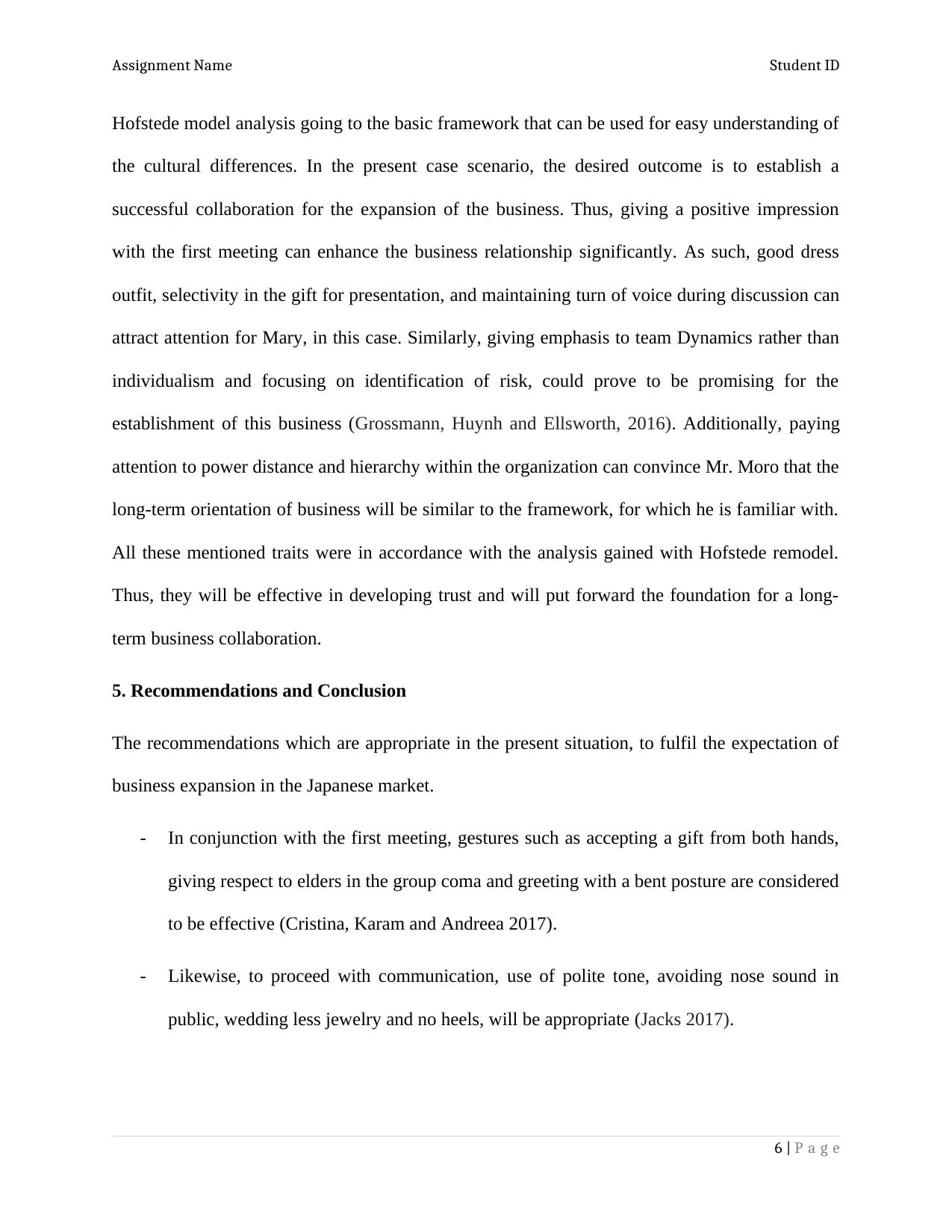
Assignment Name Student ID
Hofstede model analysis going to the basic framework that can be used for easy understanding of
the cultural differences. In the present case scenario, the desired outcome is to establish a
successful collaboration for the expansion of the business. Thus, giving a positive impression
with the first meeting can enhance the business relationship significantly. As such, good dress
outfit, selectivity in the gift for presentation, and maintaining turn of voice during discussion can
attract attention for Mary, in this case. Similarly, giving emphasis to team Dynamics rather than
individualism and focusing on identification of risk, could prove to be promising for the
establishment of this business (Grossmann, Huynh and Ellsworth, 2016). Additionally, paying
attention to power distance and hierarchy within the organization can convince Mr. Moro that the
long-term orientation of business will be similar to the framework, for which he is familiar with.
All these mentioned traits were in accordance with the analysis gained with Hofstede remodel.
Thus, they will be effective in developing trust and will put forward the foundation for a long-
term business collaboration.
5. Recommendations and Conclusion
The recommendations which are appropriate in the present situation, to fulfil the expectation of
business expansion in the Japanese market.
- In conjunction with the first meeting, gestures such as accepting a gift from both hands,
giving respect to elders in the group coma and greeting with a bent posture are considered
to be effective (Cristina, Karam and Andreea 2017).
- Likewise, to proceed with communication, use of polite tone, avoiding nose sound in
public, wedding less jewelry and no heels, will be appropriate (Jacks 2017).
6 | P a g e
Hofstede model analysis going to the basic framework that can be used for easy understanding of
the cultural differences. In the present case scenario, the desired outcome is to establish a
successful collaboration for the expansion of the business. Thus, giving a positive impression
with the first meeting can enhance the business relationship significantly. As such, good dress
outfit, selectivity in the gift for presentation, and maintaining turn of voice during discussion can
attract attention for Mary, in this case. Similarly, giving emphasis to team Dynamics rather than
individualism and focusing on identification of risk, could prove to be promising for the
establishment of this business (Grossmann, Huynh and Ellsworth, 2016). Additionally, paying
attention to power distance and hierarchy within the organization can convince Mr. Moro that the
long-term orientation of business will be similar to the framework, for which he is familiar with.
All these mentioned traits were in accordance with the analysis gained with Hofstede remodel.
Thus, they will be effective in developing trust and will put forward the foundation for a long-
term business collaboration.
5. Recommendations and Conclusion
The recommendations which are appropriate in the present situation, to fulfil the expectation of
business expansion in the Japanese market.
- In conjunction with the first meeting, gestures such as accepting a gift from both hands,
giving respect to elders in the group coma and greeting with a bent posture are considered
to be effective (Cristina, Karam and Andreea 2017).
- Likewise, to proceed with communication, use of polite tone, avoiding nose sound in
public, wedding less jewelry and no heels, will be appropriate (Jacks 2017).
6 | P a g e
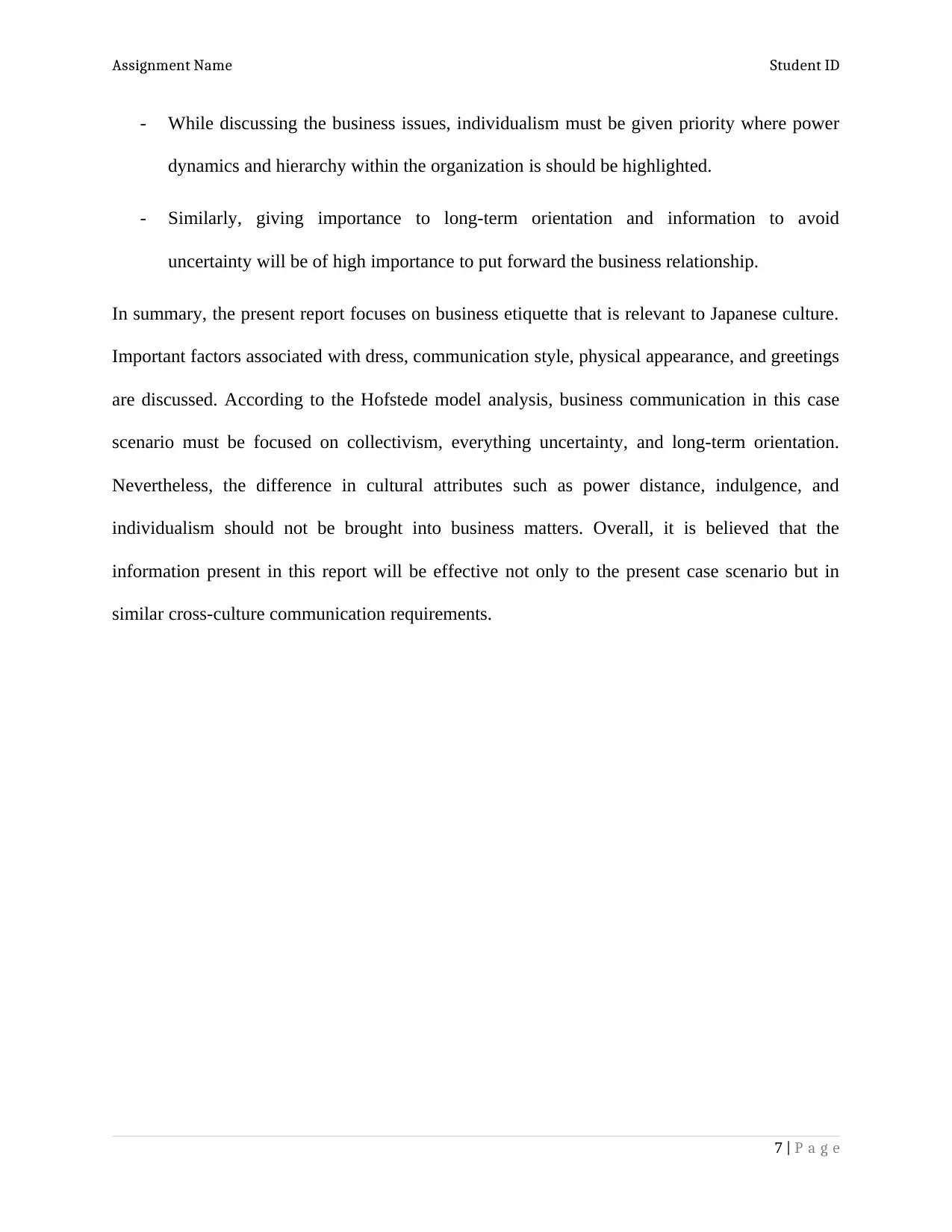
Assignment Name Student ID
- While discussing the business issues, individualism must be given priority where power
dynamics and hierarchy within the organization is should be highlighted.
- Similarly, giving importance to long-term orientation and information to avoid
uncertainty will be of high importance to put forward the business relationship.
In summary, the present report focuses on business etiquette that is relevant to Japanese culture.
Important factors associated with dress, communication style, physical appearance, and greetings
are discussed. According to the Hofstede model analysis, business communication in this case
scenario must be focused on collectivism, everything uncertainty, and long-term orientation.
Nevertheless, the difference in cultural attributes such as power distance, indulgence, and
individualism should not be brought into business matters. Overall, it is believed that the
information present in this report will be effective not only to the present case scenario but in
similar cross-culture communication requirements.
7 | P a g e
- While discussing the business issues, individualism must be given priority where power
dynamics and hierarchy within the organization is should be highlighted.
- Similarly, giving importance to long-term orientation and information to avoid
uncertainty will be of high importance to put forward the business relationship.
In summary, the present report focuses on business etiquette that is relevant to Japanese culture.
Important factors associated with dress, communication style, physical appearance, and greetings
are discussed. According to the Hofstede model analysis, business communication in this case
scenario must be focused on collectivism, everything uncertainty, and long-term orientation.
Nevertheless, the difference in cultural attributes such as power distance, indulgence, and
individualism should not be brought into business matters. Overall, it is believed that the
information present in this report will be effective not only to the present case scenario but in
similar cross-culture communication requirements.
7 | P a g e
Paraphrase This Document
Need a fresh take? Get an instant paraphrase of this document with our AI Paraphraser
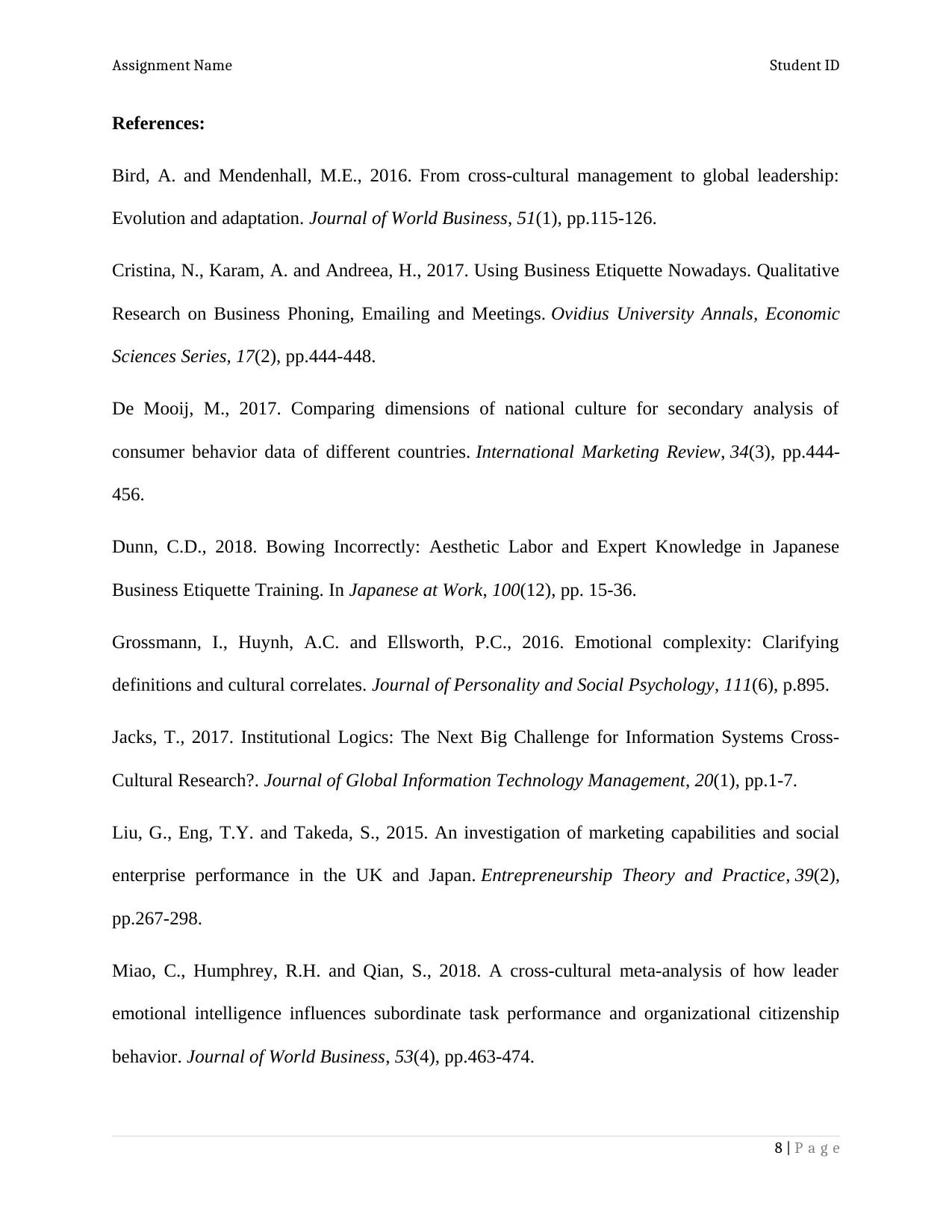
Assignment Name Student ID
References:
Bird, A. and Mendenhall, M.E., 2016. From cross-cultural management to global leadership:
Evolution and adaptation. Journal of World Business, 51(1), pp.115-126.
Cristina, N., Karam, A. and Andreea, H., 2017. Using Business Etiquette Nowadays. Qualitative
Research on Business Phoning, Emailing and Meetings. Ovidius University Annals, Economic
Sciences Series, 17(2), pp.444-448.
De Mooij, M., 2017. Comparing dimensions of national culture for secondary analysis of
consumer behavior data of different countries. International Marketing Review, 34(3), pp.444-
456.
Dunn, C.D., 2018. Bowing Incorrectly: Aesthetic Labor and Expert Knowledge in Japanese
Business Etiquette Training. In Japanese at Work, 100(12), pp. 15-36.
Grossmann, I., Huynh, A.C. and Ellsworth, P.C., 2016. Emotional complexity: Clarifying
definitions and cultural correlates. Journal of Personality and Social Psychology, 111(6), p.895.
Jacks, T., 2017. Institutional Logics: The Next Big Challenge for Information Systems Cross-
Cultural Research?. Journal of Global Information Technology Management, 20(1), pp.1-7.
Liu, G., Eng, T.Y. and Takeda, S., 2015. An investigation of marketing capabilities and social
enterprise performance in the UK and Japan. Entrepreneurship Theory and Practice, 39(2),
pp.267-298.
Miao, C., Humphrey, R.H. and Qian, S., 2018. A cross-cultural meta-analysis of how leader
emotional intelligence influences subordinate task performance and organizational citizenship
behavior. Journal of World Business, 53(4), pp.463-474.
8 | P a g e
References:
Bird, A. and Mendenhall, M.E., 2016. From cross-cultural management to global leadership:
Evolution and adaptation. Journal of World Business, 51(1), pp.115-126.
Cristina, N., Karam, A. and Andreea, H., 2017. Using Business Etiquette Nowadays. Qualitative
Research on Business Phoning, Emailing and Meetings. Ovidius University Annals, Economic
Sciences Series, 17(2), pp.444-448.
De Mooij, M., 2017. Comparing dimensions of national culture for secondary analysis of
consumer behavior data of different countries. International Marketing Review, 34(3), pp.444-
456.
Dunn, C.D., 2018. Bowing Incorrectly: Aesthetic Labor and Expert Knowledge in Japanese
Business Etiquette Training. In Japanese at Work, 100(12), pp. 15-36.
Grossmann, I., Huynh, A.C. and Ellsworth, P.C., 2016. Emotional complexity: Clarifying
definitions and cultural correlates. Journal of Personality and Social Psychology, 111(6), p.895.
Jacks, T., 2017. Institutional Logics: The Next Big Challenge for Information Systems Cross-
Cultural Research?. Journal of Global Information Technology Management, 20(1), pp.1-7.
Liu, G., Eng, T.Y. and Takeda, S., 2015. An investigation of marketing capabilities and social
enterprise performance in the UK and Japan. Entrepreneurship Theory and Practice, 39(2),
pp.267-298.
Miao, C., Humphrey, R.H. and Qian, S., 2018. A cross-cultural meta-analysis of how leader
emotional intelligence influences subordinate task performance and organizational citizenship
behavior. Journal of World Business, 53(4), pp.463-474.
8 | P a g e
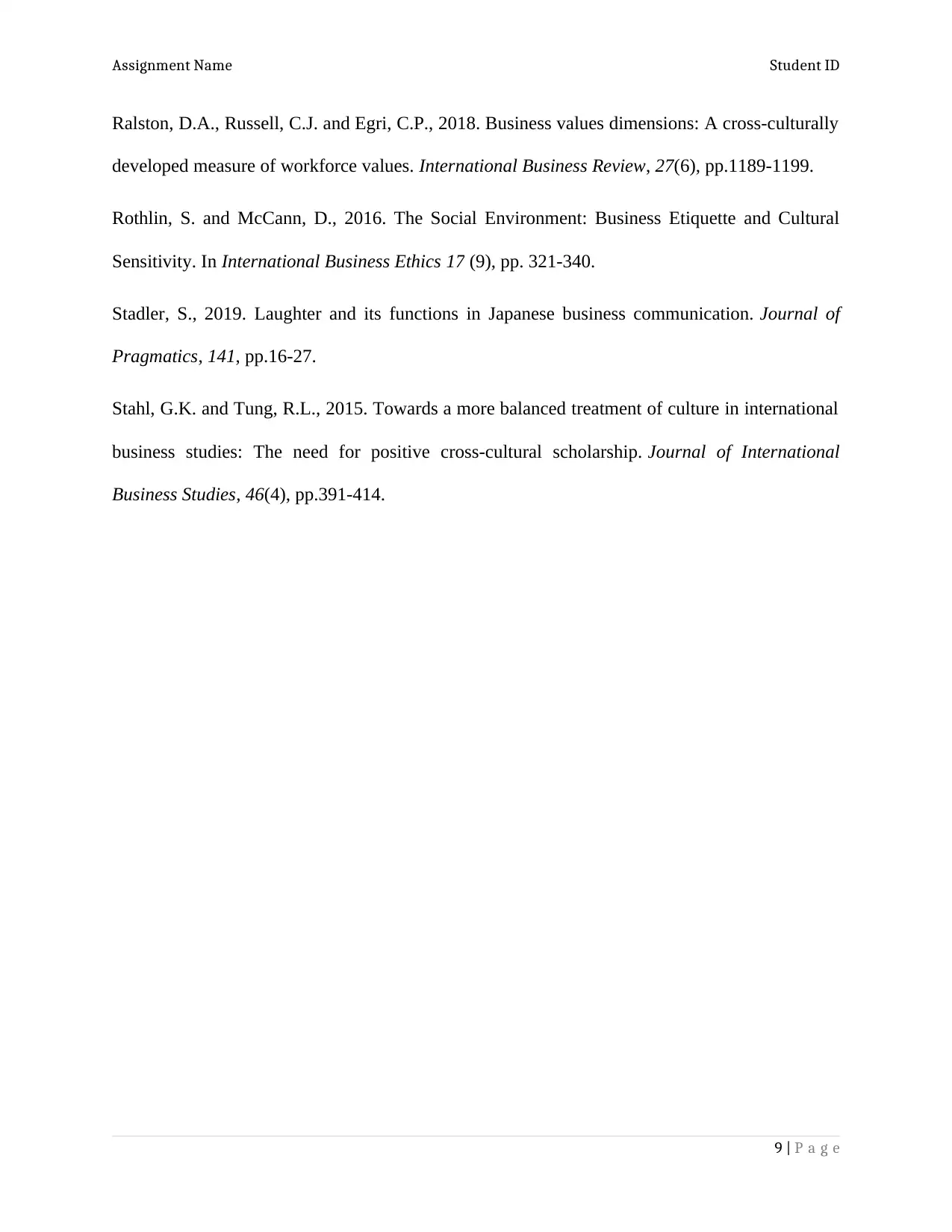
Assignment Name Student ID
Ralston, D.A., Russell, C.J. and Egri, C.P., 2018. Business values dimensions: A cross-culturally
developed measure of workforce values. International Business Review, 27(6), pp.1189-1199.
Rothlin, S. and McCann, D., 2016. The Social Environment: Business Etiquette and Cultural
Sensitivity. In International Business Ethics 17 (9), pp. 321-340.
Stadler, S., 2019. Laughter and its functions in Japanese business communication. Journal of
Pragmatics, 141, pp.16-27.
Stahl, G.K. and Tung, R.L., 2015. Towards a more balanced treatment of culture in international
business studies: The need for positive cross-cultural scholarship. Journal of International
Business Studies, 46(4), pp.391-414.
9 | P a g e
Ralston, D.A., Russell, C.J. and Egri, C.P., 2018. Business values dimensions: A cross-culturally
developed measure of workforce values. International Business Review, 27(6), pp.1189-1199.
Rothlin, S. and McCann, D., 2016. The Social Environment: Business Etiquette and Cultural
Sensitivity. In International Business Ethics 17 (9), pp. 321-340.
Stadler, S., 2019. Laughter and its functions in Japanese business communication. Journal of
Pragmatics, 141, pp.16-27.
Stahl, G.K. and Tung, R.L., 2015. Towards a more balanced treatment of culture in international
business studies: The need for positive cross-cultural scholarship. Journal of International
Business Studies, 46(4), pp.391-414.
9 | P a g e
1 out of 9
Related Documents
Your All-in-One AI-Powered Toolkit for Academic Success.
+13062052269
info@desklib.com
Available 24*7 on WhatsApp / Email
![[object Object]](/_next/static/media/star-bottom.7253800d.svg)
Unlock your academic potential
© 2024 | Zucol Services PVT LTD | All rights reserved.





